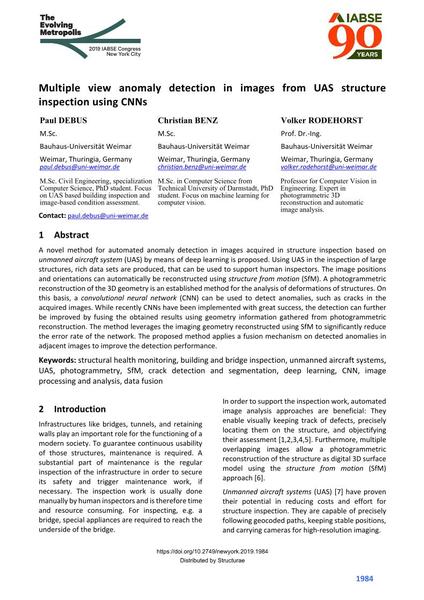Multiple view anomaly detection in images from UAS structure inspection using CNNs

|
|
|||||||||||
Bibliographic Details
| Author(s): |
Paul Debus
(Bauhaus-Universität Weimar)
Christian Benz (Bauhaus-Universität Weimar) Volker Rodehorst (Bauhaus-Universität Weimar) |
||||
|---|---|---|---|---|---|
| Medium: | conference paper | ||||
| Language(s): | English | ||||
| Conference: | IABSE Congress: The Evolving Metropolis, New York, NY, USA, 4-6 September 2019 | ||||
| Published in: | The Evolving Metropolis | ||||
|
|||||
| Page(s): | 1984-1991 | ||||
| Total no. of pages: | 8 | ||||
| DOI: | 10.2749/newyork.2019.1984 | ||||
| Abstract: |
A novel method for automated anomaly detection in images acquired in structure inspection based on unmanned aircraft system (UAS) by means of deep learning is proposed. Using UAS in the inspection of large structures, rich data sets are produced, that can be used to support human inspectors. The image positions and orientations can automatically be reconstructed using structure from motion (SfM). A photogrammetric reconstruction of the 3D geometry is an established method for the analysis of deformations of structures. On this basis, a convolutional neural network (CNN) can be used to detect anomalies, such as cracks in the acquired images. While recently CNNs have been implemented with great success, the detection can further be improved by fusing the obtained results using geometry information gathered from photogrammetric reconstruction. The method leverages the imaging geometry reconstructed using SfM to significantly reduce the error rate of the network. The proposed method applies a fusion mechanism on detected anomalies in adjacent images to improve the detection performance. |
||||
| Keywords: |
structural health monitoring image processing photogrammetry building and bridge inspection unmanned aircraft systems AUS SfM crack detection and segmentation deep learning CNN image analysis data fusion
|
||||
